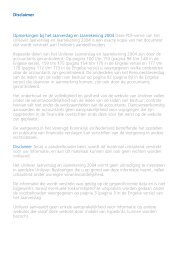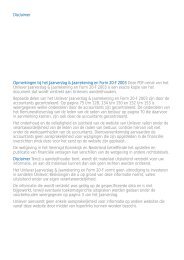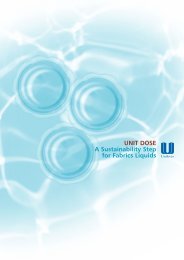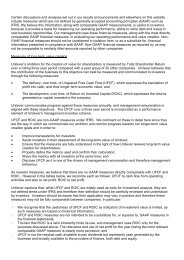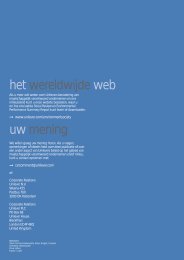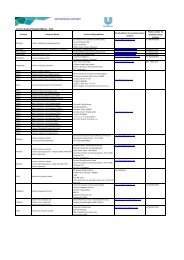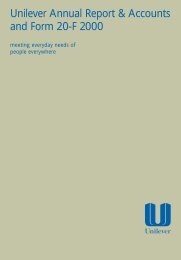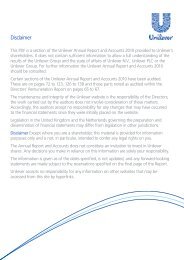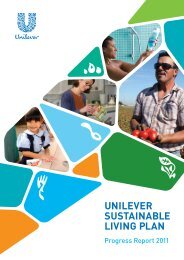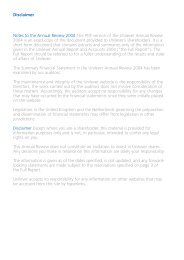Meeting everyday needs of people everywhere - Unilever
Meeting everyday needs of people everywhere - Unilever
Meeting everyday needs of people everywhere - Unilever
You also want an ePaper? Increase the reach of your titles
YUMPU automatically turns print PDFs into web optimized ePapers that Google loves.
55 <strong>Unilever</strong> Annual Report on Form 20-F 1999 Report <strong>of</strong> the Directors<br />
Remuneration report<br />
Directors are generally entitled to share options on<br />
the same basis as other employees. They participate in<br />
the NV Employee Share Option Scheme and the PLC<br />
1985 Sharesave Scheme, which are all-employee<br />
schemes, and in the International 1997 Executive Share<br />
Option Scheme.<br />
The NV Employee Share Option Scheme was introduced<br />
in 1995 and is open to all employees in the Netherlands.<br />
The PLC 1985 Sharesave Scheme is open to all employees<br />
who work a minimum number <strong>of</strong> hours in the United<br />
Kingdom. The North American Employee Stock Purchase<br />
Plan was also introduced in 1995 and is open to all<br />
employees in the United States and Canada.<br />
Grants <strong>of</strong> share options to directors and other senior<br />
executives in 1999 were made under the International<br />
1997 Executive Share Option Scheme (the ‘International<br />
Scheme’) which was established after taking into account<br />
the guidelines and views <strong>of</strong> institutional investor<br />
committees. The International Scheme comprises the<br />
NV Executive Share Option Scheme, the <strong>Unilever</strong> PLC<br />
International 1997 Executive Share Option Scheme, the<br />
<strong>Unilever</strong> PLC 1985 Executive Share Option Scheme and<br />
the North American Executive Stock Option Plan. The<br />
Boards granted options to acquire a number <strong>of</strong> ordinary<br />
shares in NV and a number <strong>of</strong> ordinary shares in PLC <strong>of</strong><br />
approximately equal market value.<br />
The Boards have established benchmark grant levels (the<br />
‘normal allocation’) to assist in determining actual grant<br />
levels under the International Scheme. In accordance with<br />
the undertaking made at the time the International<br />
Scheme was introduced, the Remuneration Committee<br />
has reviewed these normal allocations and has determined<br />
that they continue to be in line with those awarded by<br />
companies in <strong>Unilever</strong>’s peer group. The actual level <strong>of</strong><br />
grant made to each individual, which is decided by the<br />
Boards, who are advised by the Remuneration Committee,<br />
is dependent on certain performance criteria, group and<br />
individual, which are set annually by the Boards and the<br />
Remuneration Committee. These criteria must be satisfied<br />
before an individual can be granted an option.<br />
The Group criterion for 1999 was that the Group’s<br />
earnings per share over the three financial years preceding<br />
the date <strong>of</strong> grant <strong>of</strong> any option should have cumulatively<br />
risen by at least 6% more than the rate <strong>of</strong> inflation. If it<br />
had not, no grants would have been made.<br />
Once the Group criterion had been met, each individual’s<br />
option grant varied according to the percentage increase,<br />
above the rate <strong>of</strong> inflation, <strong>of</strong> the Group’s earnings per<br />
share over the financial year preceding the date <strong>of</strong> grant.<br />
The level <strong>of</strong> grant would vary according to the amount<br />
<strong>of</strong> the percentage rise. The Remuneration Committee<br />
decided that for 1999 the targets and levels <strong>of</strong> grant<br />
would be:<br />
1 1 1 1 1 0 0 1 1 1 1 1 1 0 1 1 1 0 0 1 1 1 1 1 1 0<br />
Level <strong>of</strong> grant as percentage<br />
EPS achieved in prior year <strong>of</strong> normal allocation<br />
1 1 1 1 1 0 0 1 1 1 1 1 1 0 1 1 10 0 0 1 1 1 1 1 1<br />
Inflation + less than 4% 0%<br />
Inflation + 4% 50%<br />
Inflation + 5% 75%<br />
Inflation + 6% 100%<br />
Inflation + 7% 125%<br />
Inflation + 8% or more 150%<br />
1 1 1 1 1 0 0 1 1 1 1 1 1 0 1 1 1 0 0 1 1 1 1 1 1 0<br />
The normal allocations in 1999 to which the percentages<br />
above would be applied were:<br />
1 1 1 1 1 0 0 1 1 1 1 1 1 0 1 1 1 0 0 1 1 1 1 1 1 0<br />
NV shares PLC shares<br />
111101111110111111111111011111 111111011111<br />
Chairmen 12 000 80 000<br />
Other directors 6 000 – 7 500 40 000 – 50 000<br />
1 1 1 1 1 0 0 1 1 1 1 1 1 0 1 1 1 0 0 1 1 1 1 1 1 0<br />
The price payable for each ordinary share under an option<br />
is not less than the closing price on the Stock Exchange<br />
Daily Official List on the date <strong>of</strong> grant. In normal<br />
circumstances, an option granted under the International<br />
Scheme may not be exercised earlier than three years after<br />
the date <strong>of</strong> grant.<br />
Participants are further incentivised by the grant <strong>of</strong><br />
‘premium options’. These are options granted to reward<br />
commitment and good performance over a five year<br />
period. The first premium options will be granted in 2002.<br />
To qualify for the grant <strong>of</strong> a premium option the Group<br />
must have performed well over the preceding five years<br />
and each individual must not have realised free cash from<br />
the exercise <strong>of</strong> options granted in the previous five years<br />
and must have received on average at least 100% <strong>of</strong> his<br />
normal allocation over the preceding five years. Premium<br />
options will be granted over 20% <strong>of</strong> the number <strong>of</strong><br />
shares subject to the individual’s initial grant <strong>of</strong> options<br />
under the scheme.<br />
Prior to 1997, options under the NV and PLC Executive<br />
Share Option Schemes were only granted if the<br />
Remuneration Committee was satisfied that there had<br />
been a sufficient improvement in the performance <strong>of</strong> the<br />
Group over the two to three years preceding the grant.<br />
The grant <strong>of</strong> options was discretionary. It was dependent<br />
on the Chairmen being satisfied that the grant was<br />
merited by the individual in the light <strong>of</strong> personal<br />
performance and potential for future contribution to the<br />
business. For the Boards, the Remuneration Committee<br />
had to be so satisfied. Options were phased in evenly over



